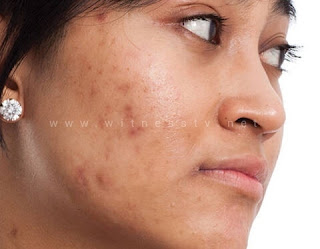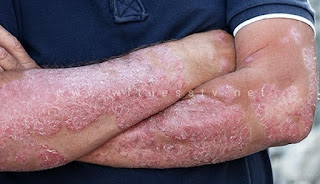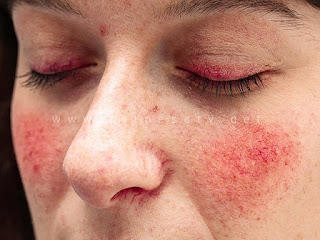SKIN ISSUES: UNDERSTANDING SKIN CANCER, ECZEMA, AND OTHER COMMON CONDITIONS
Skin issues are prevalent and can range from mild irritations to serious conditions. Understanding these issues is crucial for maintaining healthy skin. In this, we'll explore common skin problems such as skin cancer and eczema, their causes, symptoms, and available treatments.
Skin Cancer
Overview:
Skin cancer is the abnormal growth of skin cells, usually caused by exposure to ultraviolet (UV) radiation from the sun or tanning beds. It is the most common type of cancer worldwide.
Types:
There are three main types of skin cancer: basal cell carcinoma, squamous cell carcinoma, and melanoma. Melanoma is the most serious type and can spread to other parts of the body if not treated early.
Symptoms:
Symptoms of skin cancer can vary but may include changes in the skin's appearance, such as a new growth, a sore that doesn't heal, or a change in a mole's color or size.
Prevention:
Protecting your skin from the sun's harmful UV rays is key to preventing skin cancer. This includes wearing sunscreen, seeking shade, and avoiding tanning beds.
Treatment:
Treatment for skin cancer depends on the type and stage of the cancer but may include surgery, radiation therapy, chemotherapy, or immunotherapy.
Eczema
Overview:
Eczema, also known as atopic dermatitis, is a chronic skin condition that causes red, inflamed, and itchy skin. It often appears in early childhood but can affect people of all ages.
Causes:
The exact cause of eczema is unknown, but it is believed to be a combination of genetic and environmental factors. Factors such as dry skin, allergens, and stress can trigger flare-ups.
Symptoms:
Symptoms of eczema include itching, redness, dryness, and the appearance of small bumps or blisters. It can be uncomfortable and affect the quality of life.
Treatment:
Treatment for eczema focuses on relieving symptoms and preventing flare-ups. This may include moisturizing the skin, avoiding triggers, and using topical corticosteroids or other medications as prescribed by a doctor.
Other Common Skin Conditions
Acne:
Acne is a skin condition that occurs when hair follicles become clogged with oil and dead skin cells. It is common among teenagers but can affect people of all ages.
Psoriasis:
Psoriasis is a chronic autoimmune condition that causes rapid skin cell growth, leading to thick, red, and scaly patches on the skin.
Rosacea:
Rosacea is a common skin condition that causes redness and visible blood vessels in the face. It may also produce small, red, pus-filled bumps.
Skin issues like skin cancer, eczema, and other conditions are common but can be managed with proper care and treatment. Understanding the causes, symptoms, and available treatments is essential for maintaining healthy skin. By taking preventive measures and seeking medical advice when needed, you can keep your skin healthy and radiant.
Importance of Skin Health and Solutions for Common Skin Issues
Importance of Skin Health
Maintaining healthy skin is crucial for overall well-being. The skin is the body's largest organ and serves as a barrier against infection, regulates body temperature, and protects internal organs. Healthy skin also plays a role in our appearance and self-confidence. Understanding common skin issues and how to address them is essential for preserving skin health.
Solutions for Common Skin Issues
1. Skin Cancer Prevention:
Protecting your skin from the sun is key to preventing skin cancer. Use sunscreen with a high SPF, wear protective clothing, and seek shade during peak sun hours.
2. Eczema Management:
Managing eczema involves keeping the skin moisturized, avoiding triggers such as irritants and allergens, and using prescribed medications as directed by a dermatologist.
3. Acne Treatment:
Treatment for acne depends on the severity and may include topical treatments, oral medications, or procedures such as laser therapy or chemical peels.
4. Psoriasis Care:
Psoriasis treatment aims to reduce inflammation and skin cell turnover. This may include topical treatments, phototherapy, or systemic medications.
5. Rosacea Management:
Managing rosacea involves avoiding triggers such as spicy foods and alcohol, using gentle skincare products, and taking prescribed medications to reduce redness and inflammation.
Global Impact of Skin Issues
Skin issues affect people worldwide, but certain regions may have higher prevalence rates due to factors such as climate, genetics, and lifestyle. For example, skin cancer rates are higher in regions with high levels of UV radiation exposure, such as Australia and New Zealand.
How Skin Issues Develop
Skin issues can develop due to a variety of factors, including genetics, environmental factors, and lifestyle choices. For example, smoking and excessive sun exposure can increase the risk of skin cancer, while a family history of eczema may predispose someone to developing the condition.
Maintaining healthy skin is essential for overall health and well-being. By understanding common skin issues, their causes, and how to manage them, you can take proactive steps to protect your skin and reduce the risk of developing skin-related problems. Stay tuned for more informative articles on skin health and care.



























0 Comments